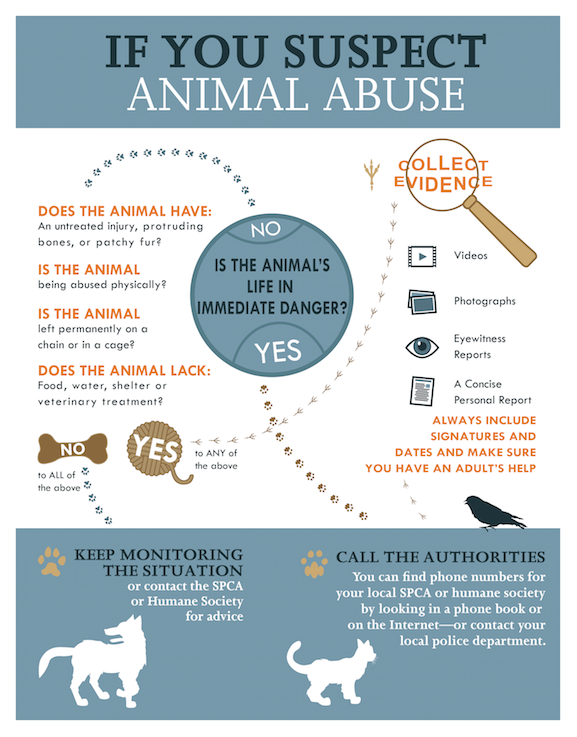Have you ever witnessed an animal in distress, perhaps tethered to a short chain, or holed up in a cramped, unsanitary environment? The sight can be heart-wrenching, igniting a sense of urgency to intervene. But before you decide to take action, have you pondered the implications of reporting animal abuse? Understanding why it matters can compel informed, decisive action to safeguard the vulnerable beings that cannot advocate for themselves.
Animal abuse represents a spectrum of cruelty that manifests in various forms, ranging from neglect to overt physical harm. Many individuals may overlook these instances, either assuming the situation is not severe enough to warrant intervention or fearing the potential backlash from the abuser. However, reporting such incidents is paramount; it plays a crucial role in both the welfare of the animals and the equation of justice that spans beyond mere accountability.
Consider this: if no one reports animal cruelty, how can anyone expect law enforcement or animal welfare organizations to step in? Acknowledging this is the first step toward understanding the collective responsibility we share in confronting the issue. Without reports, the prevalence of animal abuse remains obscured, permitting such acts to persist unchecked.
There are several layers to why reporting animal abuse is critical. Firstly, it raises awareness about the issue at hand. When an incident is reported, it alerts authorities and allows them to track patterns of behavior in specific areas. This awareness can trigger preventive measures and larger investigations into abuse on a broader scale. For instance, if a community sees repeated reports of animal neglect from the same source, authorities can take proactive measures to intervene and prevent further harm.
Reporting abuse also paves the way for educational initiatives. Many cases of abuse arise not from malicious intent, but rather from ignorance or cultural misunderstandings regarding animal care and welfare. Authorities can use reported cases as a platform to educate the public, offering resources and outreach to explain proper animal care practices, thereby reducing future incidents of neglect.
Moreover, on a psychological level, witnessing animal abuse can create a lingering trauma for bystanders. The emotional burden can weigh heavily on individuals who feel compelled to act yet find themselves at a loss. By reporting the incident, individuals can not only alleviate their own distress but also contribute to an unfolding series of actions that lead to the betterment of the animal’s situation. It is empowering to know that your voice can invoke change, and reporting becomes a channel for that empowerment.
Challenges do persist. Many people worry about the repercussions of their actions—questions about whether they’ll be taken seriously, or fears of retribution from the abuser. Some may even grapple with the moral dilemma of ‘snitching’ where they live. Such concerns are valid but should not deter individuals from reporting. Authorities are trained to handle these situations discreetly, often ensuring anonymity for the individual who makes the report. This protective measure can buffer against the fear of backlash, allowing individuals to focus on the greater good.
Additionally, the societal implications of animal cruelty are far-reaching. Research consistently shows a correlation between animal abuse and other forms of violence. Individuals who engage in acts of cruelty toward animals often exhibit similar behaviors toward humans. By reporting animal abuse, one is not just walking the path of compassion for animals; they are also contributing to the larger fabric of societal wellbeing. Animal welfare and human welfare are, indisputably, intertwined.
Furthermore, many organizations have developed streamlined processes for reporting animal abuse, often allowing for anonymous tips through hotlines or online platforms. Familiarizing yourself with local resources is essential. Understanding how to report can empower you to take action should the occasion arise. Education can amplify awareness; the more people know about local laws and the reporting process, the more likely it is that incidents will be addressed appropriately.
One may ask themselves, what if we lived in a world where every single case of animal abuse was reported? Imagine the profound change that could ripple through society—a world where no animal suffers in silence. This hopeful vision is not unreasonable when considering the impact of collective action. One report may seem like a small drop in an ocean, but thousands of drops create waves, leading to societal shifts and legislative changes that could ultimately protect countless animals.
In conclusion, the act of reporting animal abuse encapsulates more than the mere act of telling someone about a problem; it symbolizes a commitment to change and compassion that extends far beyond the individual act. It is an affirmation that we, as a society, have a duty to protect those who cannot protect themselves. Let’s challenge ourselves to be vigilant, proactive, and resolute in our voices against cruelty. Whether it is a cat in distress, a dog left outdoors in the harsh elements, or any other form of distress that catches your eye, consider this: by reporting what you see, you are not just a passive observer but an indispensable ally in the ongoing fight against animal cruelty.








